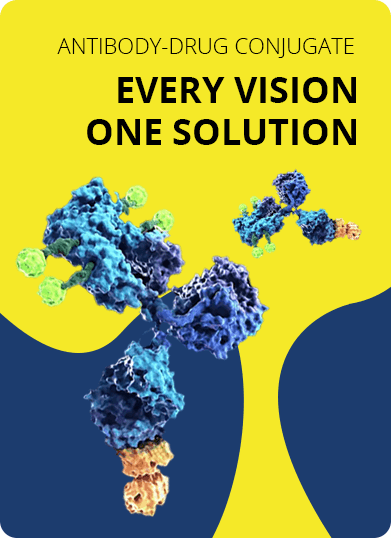- Home
- UTC Development
- Antibody-Enzyme Conjugate Development
- Antibody-directed Enzyme Prodrug Therapy (ADEPT) Development
Antibody-directed Enzyme Prodrug Therapy (ADEPT) Development Services
Consisting of antibody, enzyme, and prodrug, antibody-directed enzyme prodrug therapy (ADEPT) has attracted considerable interest as a promising immunotherapy approach. As a world’s leading service provider in the field of antibody and antibody-drug conjugate (ADC), Creative Biolabs provides comprehensive customized ADEPT development services for global customers. Our expert team offers the most professional solutions to ensure the progress of your research.
Antibody Component of ADEPT
Many types of MAb formats have been used as targeting agents in ADEPT development, including Fab, scFvs, dsFv and camelid VHH Abs. The antigen-binding (Fab) fragment is a region on an antibody that binds to antigens. It is composed of one constant domain and one variable domain of each of the heavy and the light chain. The variable domain comprises a set of complementarity determining regions (CDR) to bind to the antigen. Single-chain variable-fragment (scFv) consists of one light chain and one heavy chain variable regions of immunoglobulins (Igs) connected by a peptide linker. It contains the intact antigen-binding site as a specific antibody. scFvs are the most appropriate mAb used in ADEPT as it has more rapid tumor penetration and clearance from the serum relative to full-length monoclonal antibodies (mAbs). scFvs are promising diagnostic and therapeutic reagents for protein misfolded diseases which are widely used in antibody-based immunotherapies. The dsFv as the dimer form of scFv also be used in a few antibody-directed enzyme prodrug therapies for cancer therapy. Camelid VHH Abs, also referred to as sdAbs, are naturally occurring single-domain VHH antibody fragments found in camels that have evolved to be fully functional in the absence of a light chain. Compared with a whole antibody, VHH harbors advantages including easy to link to a fluorescent marker or to conjugate with an enzyme with more stability. VHH has been widely used in ADEPT, for example, it was fused with β-lactamase to target carcinoembryonic antigen (CEA).
Enzyme Component of ADEPT
In ADEPT development, the choice of the enzyme is an important issue. A human enzyme is likely to be nonimmunogenic but the active drug would be generated wherever it is normally located. A non-mammalian enzyme with no human analog is of more specificity but with immunogenic. Unless appropriately controlled, repeated use of non-mammalian enzyme would be limited by the host response. Some bacterial enzymes also have the advantage of superior kinetics with the potential to turn over prodrugs more efficiently than mammalian enzymes as some operate optimally at the PH of human body fluids. To date, various non-mammalian enzymes have been used in the ADEPT clinic trials, such as Carboxypeptidase G2, β-lactamase, Cytosine deaminase and so on. In addition, several human enzymes also have the potential to be applied in ADEPT, an example of this approach is the use of human β-glucuronidase, an enzyme normally present in microsomes and lysosomes and has very limited activity in the blood.
Prodrug Component of ADEPT
A potential advantage of ADEPT is the expectation that it may be possible to deliver a higher concentration of drug to tumors, and the drug generated from the prodrug should effect a linear dose-related cell kill (i.e, a higher concentration of the drug should kill more cells). For many cytotoxic agents, such a relationship does not exist and the cell-kill effect eventually plateaus as the dose increases. Over the past 30 years, numerous prodrugs have been exhibited could used as the substrates of ADEPT enzyme partners. Such as benzoic acid mustards as the substrate of Carboxypeptidase G2, β-glucuronidase with the ability to catalyze multiple prodrugs (e.g. Phenol mustard glucuronide, Daunorubicin glucuronide, Glucuronide camptothecin) yielding potent drug. 5-Fluorocytosine can be catalyzed to produce effective anticancer medicine 5-Fluorouracil by cytosine deaminase.
ADEPT
About 30 years ago, ADEPT was first proposed to overcome some of the limitations of early ADCs. ADEPT did not need internalization but aimed to generate drug in the extracellular areas of the tumor. Compared with traditional cancer treatments, antibody-enzyme conjugate proteins provide greater tumor specificity, potency, and reduced patient side effects. Enzymes can be powerful weapons in the anticancer armory, particularly when they are conferred with cancer-selectivity by targeting to tumor cells using specific antibodies. In addition, the monoclonal antibody is a critical element in the therapeutic schedule. The specific mAb such as a humanized monoclonal antibody scFv mAb enables the delivery of enzymes exclusively to the tumor site to target tumor cell antigen residues, as a result, reducing the damage to the normal tissues. Upon the mAb binding to the antigen of tumor cells, a nontoxic prodrug is administered and activated by the enzyme. The active drug causes localized cytotoxicity to tumor cells bearing the antigen and mediates bystander effects to neighboring tumor cells.
Features
- High affinity and high specificity mAbs available.
- ADEPT project design with comprehensive strategies.
- Advanced technology platforms and experienced scientists.
- High-quality and cost-effective services.
With an enriched experience of antibody-associated conjugation, Creative Biolabs is dedicated to helping you develop your novel ADEPT in a timely and cost-effective manner. Our high-quality services and products will contribute greatly to the success of your projects. Please feel free to contact us for more information and a detailed quote.
For Research Use Only. NOT FOR CLINICAL USE.

Online Inquiry
Welcome! For price inquiries, please feel free to contact us through the form on the left side. We will get back to you as soon as possible.
